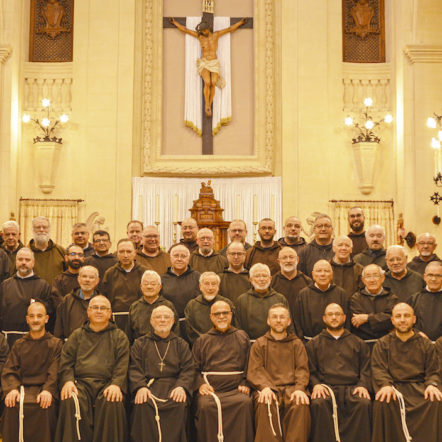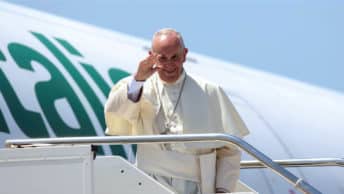During the third week of May, the Maltese Capuchin Province celebrated 70 years of its beautiful history. I had the grace to be one of those who actively participated in this chapter, which was held at our Holy Cross Friar in Floriana, our Capuchin mother-house. Already the name of the venue where we were assembled for the Provincial Chapter rings an important bell: the Holy Cross. Naturally, it came into my mind and heart the prayer which St Francis fervently prayed before the Crucifix: Most High glorious God, enlighten the darkness of my heart. Give me right faith, sure hope and perfect charity. Fill me with understanding and knowledge that I may fulfill your command.
All of us, capitulars, were praying the same prayer with our Seraphic Father and Brother Francis so that we too be enlightened amid the darkness of our hearts by Jesus’ right faith, sure hope and perfect charity. We too felt the dire need to ask Jesus to fill us with His understanding and Knowledge to accomplish His wish. I was very touched by the prayer we prayed together at the beginning of each plenary session we had.
Lord, I pray for my fraternity, so that we can understand each other mutually, be united in what we want and accept our limitations in order that each one of us feels and makes his own the needs of others , the moments of weakness and worry. Make that these moments make us draw to each other more in our pursuit for the truth and for that which is good, so that each one of us, while he lives his own life, totally makes it possible for others to do the same. Make that we can share together the moments of joy whilst acknowledging you as the source of true joy. Above all, we pray to you so that we can love one another as you loved us and that we seek that which is the true good for others. Make that our fraternity does not close itself up but be open, available and sensitive to the needs of the Church.
This initial prayer, which introduced each session of the chapter, shows the value of fraternal life, wisdom and discernment. It makes it so clear that each brother counts, but within the context of the Capuchin fraternity which, in itself, is duty and morally bound to be open, available and sensitive to the needs of the particular and universal Church. Otherwise, it becomes an approved Catholic sect within the Catholic Communion.
During the Chapter there were many instances wherein one could appreciate the bold efforts that were made in order not to let the Maltese Capuchin Provincial fraternity from becoming a sect and be more truly Christian and Catholic. At the initial speech of the Chapter Bro. Pio Murat OFM Cap highlighted some important aspects from the Gospel of John 20 that were deemed appropriate for the occasion. He highlighted the Johannine detail: the doors being shut (John 20:19) and the doors were shut (John 20:26). In front of the outstanding phenomenon of Jesus’ resurrection there was an air of an absence of faith. Amid these lack of faith Jesus twice says: Peace be with you (John 20:19. 21.26). That peace be with you means that He is blessing his terrified disciples. However, by reassuring them that He has truly risen He is also telling them to be living icons of his peace which means that they were to forgive and welcome each other reciprocally. They were to be the living witnesses of His reconciliation by being reconciled with one another. Was this not the great wonder Jesus was working before them, namely that his stigmata are now resurrected with him?
Bro Pio invited each brother to open our doors so that the Holy Spirit could enter into our hearts. He stressed that this is an urgent call since without the Holy Spirit we are nothing and can do nothing either. Finally, Bro. Pio wisely and caringly advised us to pray for the gift of the Holy Spirit.
Another salient moment in the Chapter was when the Maltese Cardinal Mario Grech spoke to us via video conferencing. He was addressing the issue on the synodality of the Church. It is interesting that Cardinal Grech defined consecrated life as an icon of synodality. In many ways Pope Francis is encouraging us, consecrated people, to make our own synodal journey both within our institutes of consecrated life as well as with the entire Church.
Reflecting on the very valid image of Cardinal Grech it came into my heart and mind that we, as consecrated people, need to avoid three potential disastrous dangers within this synodal process within our institutes. First, elitism which fosters the erroneous idea that only the ideas of some, mainly those in the hierarchy and preferred by the hierarchy really count. Second, intellectualizing the synodal process. Offering abstract approaches to the problems of consecrated life within and for the Church and the world really are not fruitful at all. They tend to alienate from reality. Thirdly, complacency. This is translated to the fact that “we have always done it this way”. Hence, there is no need for change. We cannot make us of old solutions to new problems. On the contrary, we need to start let the Holy Spirit repair consecrated life, and through it the entire Church, from the bottom up with that much needed excitement and effort which will bring about communion and participation that is channelled for mission.
Life is not merely about avoiding risks but also about fulfilling opportunities. mainly encounter, listening and reflection. In order to foster more and more the spirit of synodality within its ranks, consecrated life has to be a place of encounter, wherein each member can truly feel at home to actively participate. Second, listening greatly helps to break out of our routine to stop and listen, first and foremost, to the Spirit in adoration and prayer, and then to our brothers and sisters within the consecrated life. We are to listen to their hopes, the crises of faith and the need for new ways of reaching them. Thirdly, this synodal spirit makes consecrated life a privileged place where closeness, compassion and tenderness are the order of the day. We need to experience consecrated life as the field hospital of bandaging wounds and healing broken hearts with the balm of the Spirit.
Finally, Cardinal Grech mentioned the need, for us Franciscans, to follow the Franciscan discernment. The following ten tips for it might help: (1) Write a prayer journal; (2) Set a prayer appointment; (3) Get out in Nature Recognizing the beauty, truth and goodness in God’s creation; (4) Rely on others; (5) Seek out stories; (6) Receive The Sacraments; (7) Read the Psalms; (8) Devote yourself To the Holy Spirit; (9) Find a Mentor; (10) Go on retreat. Personally I would add three other criteria: (11) See what is the feeling in your international fraternity as an Institute of Consecrated Life as well as your provincial fraternity; (12) Observe where the universal Church is going and (13) Updating the traditional apostolic initiatives of your international Institute of Consecrated Life and your provincial fraternity to aptly respond to the needs of today’s Church and world.
In all this process participated leadership is pivotal for this epochal change!
During the discussions in the Chapter there was an interesting discussion on The “Saint Lorenzo of Brindisi Project” of the Capuchin Friars Minor. This project is about fanning the Flame of our Franciscan Capuchin charism of brotherhood. Bro Pio’s presentation of the subject was not simply a history but a living narrative in order for the brothers, who feel called by God, to continue writing it together in the future by joining for sometime this project. The “St. Lawrence of Brindisi Project” is not innovative for innovation’s sake but it is a realization that is meant to reflect and stimulate all our fraternities to live according to “the form of the Holy Gospel”, in the light of our Capuchin Constitutions.
Finally I was really encouraged by the sterling work that is being done within the fields of vocational promotion, working with the homeless thanks to the Suriet il-Bniedem (In the image of Man) Foundation as well as in the hospital chaplaincies and prisons. I strongly believe that these kinds of apostolates should be maintained as they best define our Franciscan Capuchin charism. With tears in my eyes I affectionately recall what the VII° PCO (Plenary Council of the Capuchin Order) on Fraternal Life in Minority in Assisi, celebrated in 2004, says about this when it clearly speaks about the obedience to the Church and in the least sought-after ministries:
In this way let us remain sincerely available to serve the local and universal Church, working in harmony with its pastors (Test 8-10). We should give priority to ministries that are more in keeping with our vocation as minors, assuming pastoral commitments on the boundaries, especially ministries that are least sought after in the Church, where we can more easily manifest compassion and closeness to people, whether in out-of-town parishes, hospital chaplaincies and ministry to the sick or marginalized who suffer poverty in forms old and new (no.38).
This highly complements to what we find in our Capuchin Constitutions: After the example of Saint Francis, who had great compassion for the poor, and the founders of our Capuchin brotherhood, who helped those suffering from the plague, let us live alongside our brothers and sisters in need, especially the sick, eager to offer them wholehearted service as brothers (Const 108,3). Let us promote the customary works of the apostolate such as popular missions, retreats, the sacramental confession of the faithful, the spiritual care of religious women, especially Franciscans, care of the sick and of prisoners, works of education and of social development (Const 149,2). After the example of Saint Francis and the enduring tradition of the order, we willingly undertake the spiritual, and even bodily, care of the sick and infirm. Following Christ Who went through towns and villages healing every kind of sickness and infirmity as a sign of the arrival of the Kingdom of God, we fulfil the mission of the Church. Through her children, she is at one with people of every condition, especially the poor and afflicted, and willingly spends herself for them (Const 153,1-2). Gathered together in Christ as a single distinctive family, we develop among ourselves relationships that are fraternally spontaneous, and gladly live among those who are poor, weak and infirm, sharing in their lives and maintaining our characteristic closeness to people (Const 5,4).
The Capuchin Constitutions clearly say: It is the responsibility of the provincial chapter to adapt apostolic work to the needs of the times, while preserving our Capuchin Franciscan identity ( Const 148,3). Certainly working with the sick, the prisoners, the homeless and those who feel spiritually lost, with the innovative involvement of the Tertiary Franciscans, must be a priority within the life, work and mission of the Franciscan Capuchin Charism of brotherhood. This is the main insight gathered from the celebration of the 70th Provincial Chapter of the Maltese Capuchin Province.





